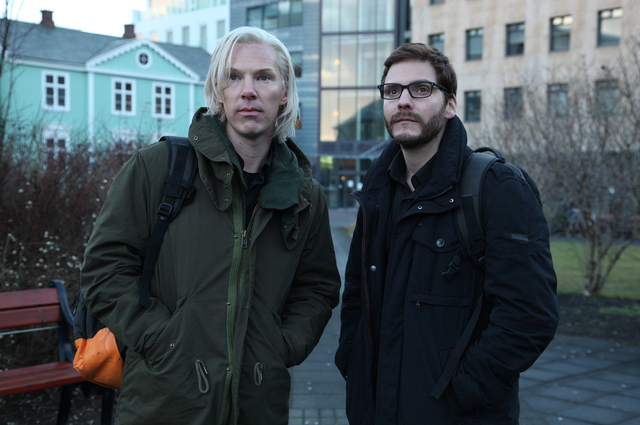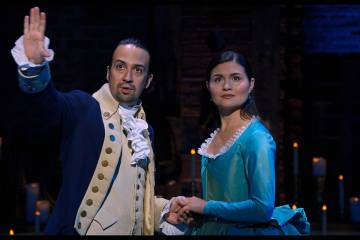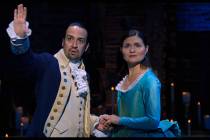‘Fifth Estate’ hollow, unfocused portrait of Wikileaks founder Julian Assange
By now, raving about Benedict Cumberbatch has become as commonplace as chatting about the weather or complaining about that thing Miley Cyrus won’t stop doing with her tongue.
Daniel Bruhl demanded moviegoers’ attention in “Rush” — or at least the attention of those few moviegoers who’ve bothered to see “Rush” — and seems destined to be anointed by the type of universal praise that’s accompanied Cumberbatch’s work in everything from “Sherlock” to “Star Trek Into Darkness”
But even their fine performances can’t keep the WikiLeaks saga “The Fifth Estate” from feeling hollow and unfocused with no real sense of urgency.
WikiLeaks founder Julian Assange (Cumberbatch) is a deeply divisive and controversial figure. He’s alternately hailed as a hero and vilified as a war criminal. For long stretches, even the movie isn’t sure what to make of him.
But given that “The Fifth Estate” is based in part on “Inside WikiLeaks: My Time With Julian Assange at the World’s Most Dangerous Website,” written by Daniel Domscheit-Berg, Assange’s WikiLeaks colleague who’s brought to life by Bruhl, you have a pretty good idea with whom the film ultimately will side.
It’s the same fate that befell Steven Soderbergh’s far superior “Behind the Candelabra.” When the lesser-known, spurned half of a relationship provides the basis for a look at their more famous counterpart, things tend to get a bit messy.
The globe-hopping drama follows the duo from a chance encounter in Berlin in December 2007, when WikiLeaks already was up and running, through the site’s 2010 release of more than 90,000 documents from the war in Afghanistan and a quarter of a million classified cables. Along the way, they expose everything from banking irregularities and election fraud to human rights abuses and Kenyan death squads.
In doing so, “The Fifth Estate” desperately wants to be “All the President’s Men” with an EDM soundtrack. An investigative reporter (David Thewlis) with London’s The Guardian even awkwardly refers to Assange and Domscheit-Berg as a young Woodward and Bernstein. But Bob Woodward and Carl Bernstein didn’t just disseminate information. They crafted compelling stories. Something “The Fifth Estate” never quite manages to accomplish.
Director Bill Condon (“Dreamgirls”) and screenwriter Josh Singer (TV’s “Fringe”), who also adapted “WikiLeaks: Inside Julian Assange’s War on Secrecy” by David Leigh and Luke Harding, have plenty of source material. But it never jells in the way the equally unwieldy Facebook story “The Social Network” did. To break up the monotony of two guys banging away on their laptops, Condon and Singer rely on a distracting virtual office to illustrate their work.
Speaking of distractions, at one point the filmmakers have Cumberbatch’s Assange denounce both books as well as the very movie you’re watching. (The real Assange also blasted the movie and, true to form, leaked a draft of its script online. If anything, Assange should consider legal action just based on the film’s depiction of his dancing skills.)
Laura Linney and Stanley Tucci turn up every so often as State Department officials as though they’re part of some different movie that recognizes how dangerous such leaks really are.
But although “The Fifth Estate” ends up being as much the story of Domscheit-Berg and his perceived betrayal — and serves, along with “Rush,” as a fantastic introduction to Bruhl’s emerging talent — this is Assange’s show, and Cumberbatch is never less than compelling.
Pitched somewhere between Asperger and a Bond villain, his Assange is part hacker, part huckster; part rock star, part recluse. He’s full of the kind of engaging rhetoric — “courage is contagious,” “true commitment requires sacrifice” — that could inspire a dozen cult leaders.
Eventually, “The Fifth Estate” begins painting him as a man unraveling under the glare of the media he distrusts. When Assange receives a shocking video proving an American cover-up of the deaths of Reuters employees in Iraq, his first reaction is how much it will boost traffic and donations to his site.
Then the movie settles for trying to embarrass him. Throughout, Assange gives conflicting reasons for why his hair famously turned white. Then Domscheit-Berg adds in a voice-over aside that he once caught Assange dying it. It feels like an out-of-left-field cheap shot.
“The Fifth Estate” finally, fully paints Assange as a villain for callously refusing to consider all the innocent people whose lives will be put at risk by his massive, unprecedented release of those government documents. “Editing,” he repeats, “reflects bias.”
Curiously, though, for a movie so concerned with redactions or the lack thereof, it sure feels as though there’s plenty missing.
Contact Christopher Lawrence at clawrence@ reviewjournal.com or 702-380-4567.
Review
"The Fifth Estate"
124 minutes
R; language and some violence
Grade: B-
At multiple locations






















